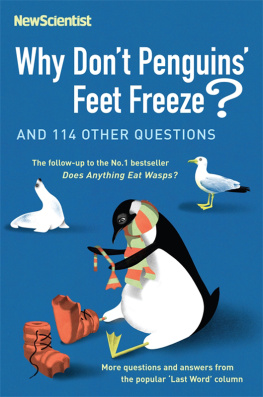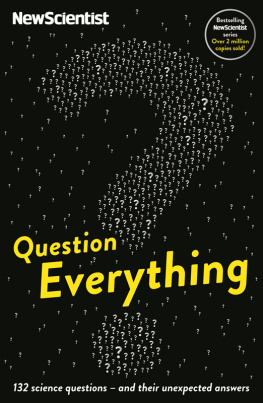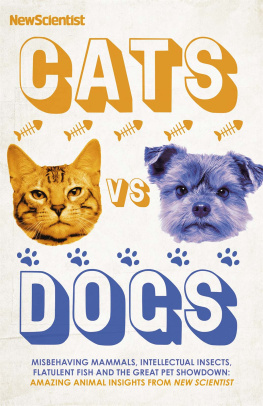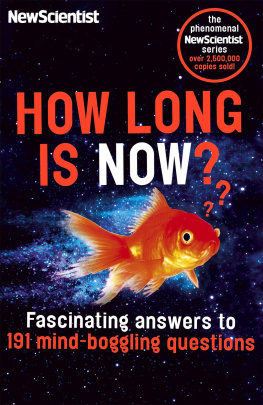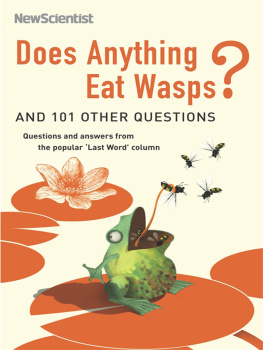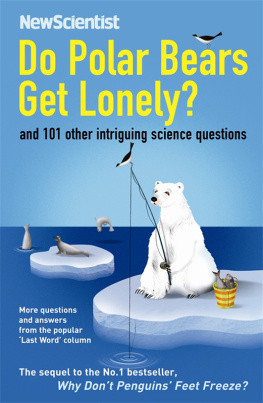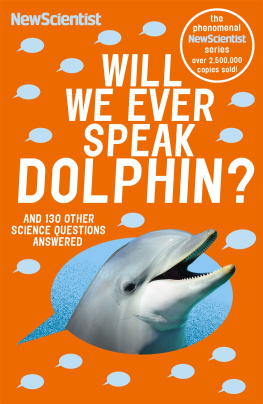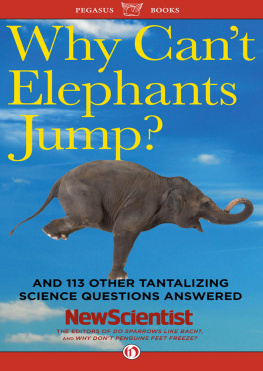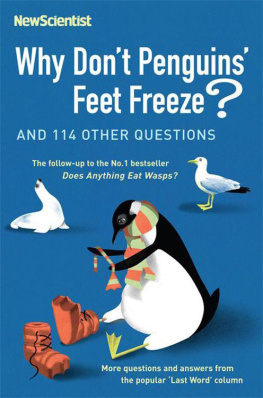OHare - Why Dont Penguins Feet Freeze?
Here you can read online OHare - Why Dont Penguins Feet Freeze? full text of the book (entire story) in english for free. Download pdf and epub, get meaning, cover and reviews about this ebook. year: 2009;2007, publisher: Profile Books, genre: Religion. Description of the work, (preface) as well as reviews are available. Best literature library LitArk.com created for fans of good reading and offers a wide selection of genres:
Romance novel
Science fiction
Adventure
Detective
Science
History
Home and family
Prose
Art
Politics
Computer
Non-fiction
Religion
Business
Children
Humor
Choose a favorite category and find really read worthwhile books. Enjoy immersion in the world of imagination, feel the emotions of the characters or learn something new for yourself, make an fascinating discovery.
Why Dont Penguins Feet Freeze?: summary, description and annotation
We offer to read an annotation, description, summary or preface (depends on what the author of the book "Why Dont Penguins Feet Freeze?" wrote himself). If you haven't found the necessary information about the book — write in the comments, we will try to find it.
OHare: author's other books
Who wrote Why Dont Penguins Feet Freeze?? Find out the surname, the name of the author of the book and a list of all author's works by series.
Why Dont Penguins Feet Freeze? — read online for free the complete book (whole text) full work
Below is the text of the book, divided by pages. System saving the place of the last page read, allows you to conveniently read the book "Why Dont Penguins Feet Freeze?" online for free, without having to search again every time where you left off. Put a bookmark, and you can go to the page where you finished reading at any time.
Font size:
Interval:
Bookmark:

NewScientist
Why Dont
Penguins Feet
Freeze?
and 114 other questions
More questions and answers
from the popular Last Word column
edited by Mick OHare

First published in Great Britain in 2006 by
PROFILE BOOKS LTD
3A Exmouth House
Pine Street
London EC1R OJH
www.profilebooks.com
This eBook edition first published in 2009
Copyright New Scientist, 2006
The moral right of the authors has been asserted.
Text design by Sue Lamble
Typeset by MacGuru Ltd
info@macguru.org.uk
This eBook is copyright material and must not be copied, reproduced,transferred, distributed, leased, licensed or publicly performed or used in any way except as specifically permitted in writing by the publishers, as allowed under the terms and conditions under which it was purchased or as strictly permitted by applicable copyright law. Any unauthorised distribution or use of this text may be a direct infringement of the authors and publishers rights and those responsible may be liable in law accordingly.
A CIP catalogue record for this book is available from the British Library.
eISBN: 978-1-84765-084-9
Contents
This books predecessor, Does Anything Eat Wasps?, was the surprise publishing phenomenon of the 2005 Christmas season. The quirky collection of science questions and answers from NewScientists Last Word column took the bestseller lists by storm, leaving those associated with the columns 13-year history a little shell-shocked and breathless. This sense of surprise was reinforced by the fact that Does Anything Eat Wasps? was actually the third collection of Last Word questions and answers in book form. The first two had modestly paid their way without ever troubling the bestseller charts. Which, on reflection, seems a pity, for those first two volumes contain some of the questions that have come to define exactly what The Last Word represents: the pursuit of the offbeat and the trivial. Why is snot green? Why does grilled cheese go stringy? Why does silver foil make tooth fillings painful? And, of course, why dont penguins feet freeze?
Perhaps more importantly, those first two books also contain answers to questions that are asked every week by readers who newly discover The Last Word. It seems everybody wants to know why hair turns grey or the sky is blue. And you can find the answers.
Interestingly, the most popular question when the first two Last Word books were translated into German was Why dont sleeping birds fall out of trees? This led to the longest title of any New Scientist book published anywhere in the world Warum fallen schlafendeVgelnicht vom Baum? And although the title WhyDontPenguinsFeet Freeze? does not match this for length, this book is by far the thickest and best-value collection of Last Word questions yet published. Since we feel the first two books deserved a wider audience, weve combined the best questions and answers from those volumes with some wholly new material from the weekly magazine column to create this bumper edition. Added together, we hope they will keep you entertained for weeks to come.
Does Anything Eat Wasps? generated a vast amount of media coverage, during which I was constantly asked why my book had sold so well. The truth was, of course, that it wasnt my book at all; it belonged to the readers of NewScientist. Remember, everything you see here is provided by contributors to The Last Word, both in the weekly print edition of New Scientist and online. Thousands of questions are posed every year and just as many answers are received. So if you have something to ask NewScientists readers visit www.newscientist.com/lastword or buy the weekly magazine. Even better, if your friends routinely describe you as a complete know-all or, like me, the pub bore you are just the kind of person we are looking for. The Last Word is your natural home, so why not help us answer our endless supply of questions? Without readers input The Last Word would not survive and, as youll read here, none of us would know how to toughen up our conkers.
Enjoy this fascinating compilation and keep those questions flooding in.
Mick OHare
Again, special thanks are due to Jeremy Webb, Lucy Middleton, Alun Anderson, the production and subbing teams of NewScientist and the people at Profile Books for making this book far better than it might have been.
 Grey matters
Grey matters
Why does hair turn grey?
Keren Bagon
Radlett, Hertfordshire, UK
Grey (or white) is merely the base colour of hair. Pigment cells located at the base of each hair follicle produce the natural dominant colour of our youth. However, as a person grows older and reaches middle age, more and more of these pigment cells die and colour is lost from individual hairs. The result is that a persons hair gradually begins to show more and more grey.
The whole process may take between 10 and 20 years rarely does a persons entire collection of individual hairs (which, depending on hair loss, can number in the hundreds of thousands) go grey overnight. Interestingly, the colour-enhancing cells often speed up pigment production as we age, so hair sometimes darkens temporarily before the pigment cells die.
Bob Barnhurst
Pointe-Claire, Quebec, Canada
 Light sneeze
Light sneeze
I have noticed that many people tend to sneeze when they go fromdark conditions into very bright light. What is the reason for this?
D. Boothroyd
Harpenden, Hertfordshire, UK
Photons get up your nose!
Steve Joseph
Sussex, UK
I think that the answer may be fairly simple: when the sun hits a given area, particularly one shielded or enclosed in glass, there is a marked rise in local temperature. This results in warming of the air and a subsequent upward movement of the air and, with it, many millions of particles of dust and hair fibres. These particles quite literally get up ones nose within seconds of being elevated, hence the sneezing.
Alan Beswick
Birkenhead, Merseyside, UK
My mother, one of my sisters and I all experience this. I feel the behaviour is genetic and confers an unrecognised evolutionary advantage. I have questioned many people, and we sun-sneezers seem to be in the minority. However, as the ozone thins and more ultraviolet light penetrates the Earths atmosphere, it will become increasingly dangerous to allow direct sunlight into the eye. Those of us with the sun-sneeze gene will not be exposed to this, as our eyes automatically close as we sneeze! The rest of the population will gradually go blind, something not usually favoured by natural selection.
Alex Hallatt
Newbury, Berkshire, UK
The tendency to sneeze on exposure to bright light is termed the photic sneeze. It is a genetic character transmitted from one generation to the next and which affects between 18 and 35 per cent of the population. The sneeze occurs because the protective reflexes of the eyes (in this case on encountering bright light) and nose are closely linked. Likewise, when we sneeze our eyes close and also water. The photic sneeze is well known as a hazard to pilots of combat planes, especially when they turn towards the sun or are exposed to flares from anti-aircraft fire at night.
Font size:
Interval:
Bookmark:
Similar books «Why Dont Penguins Feet Freeze?»
Look at similar books to Why Dont Penguins Feet Freeze?. We have selected literature similar in name and meaning in the hope of providing readers with more options to find new, interesting, not yet read works.
Discussion, reviews of the book Why Dont Penguins Feet Freeze? and just readers' own opinions. Leave your comments, write what you think about the work, its meaning or the main characters. Specify what exactly you liked and what you didn't like, and why you think so.

